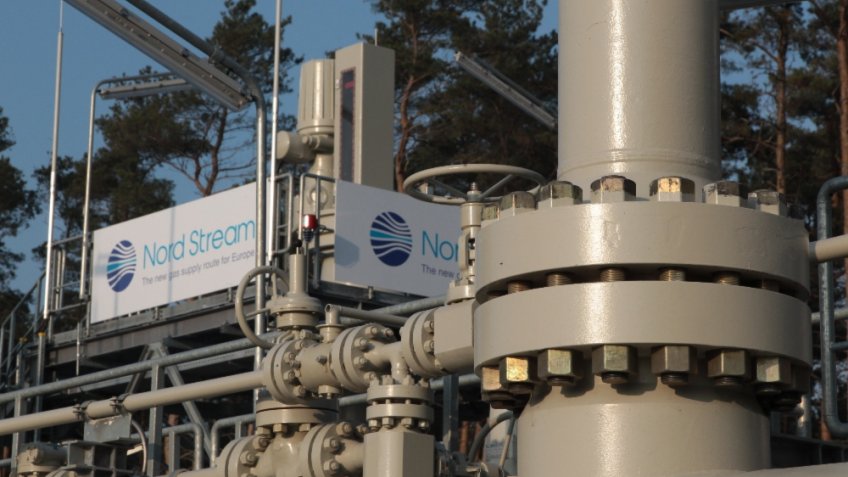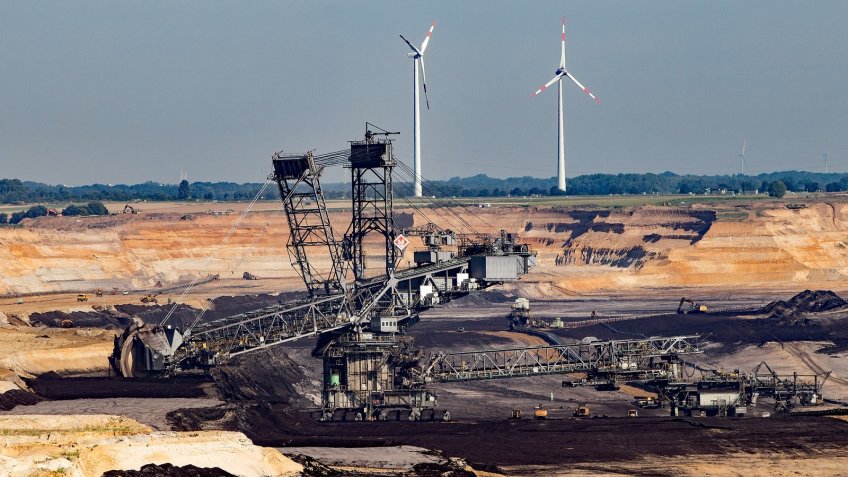
German Chancellor Olaf Scholz, speaking at the UN climate conference in Sharm el-Sheikh, announced that he would increase annual investments in climate protection from 5.3 to 6 billion euros by 2025. He also assured those present that in 23 years time, Germany will be the first country in the world to make the energy transition, i.e. to move away from the use of fossil fuels, as planned.
How realistic is this, considering that Germans are now living with a severe shortage of electricity? And what role can research into the production and use of hydrogen play in achieving carbon neutrality? Forpost addressed these questions to Vladimir Litvinenko, a leading expert in the field of fuel and energy complex, scientific leader of the Governmental Working Group on Hydrogen Energy Development in Russia.
- Vladimir Stefanovich, last week methane prices in Europe dropped to $1,100 per thousand cubic meters. Does this mean that thanks to US LNG deliveries and the growth of solar and wind generation, the EU authorities were able to relatively painlessly pass through the acute phase of the energy crisis and reduce their dependence on natural gas supplies from Russia?
Vladimir Litvinenko: Europe today is living in energy poverty. This is obvious. In many countries, decisions have been made at the governmental level to turn off lights in buildings, storefronts, lighting on country roads, and to limit indoor temperature to 19-20 degrees. In Germany, starting this week, hypermarkets will close one hour earlier than usual to save electricity.
This is the new reality that EU citizens are gradually getting used to. Moreover, this is far from being the end of the story. If the winter turns out to be too cold, the Old World is practically guaranteed problems associated with rolling blackouts of electricity and heat supply. It is quite possible to solve them even now, after the terrorist attacks on the trans-Baltic pipelines, by commissioning the unaffected string of Nord Stream 2. This would reduce the shortage of natural gas in Europe and contribute to a decrease in gas prices.
But this is not happening. And not because the EU states allegedly do not want to contribute to increasing Russia's budget revenues, after all, they pay for the methane gas that comes through Ukraine or via Turkish Stream. That's not the point. Washington and the Western elites who control LNG exports from the U.S. have a vested interest in continuing to make super profits from its sales. A return to the previous price levels of $200 or even $300 per 1,000 cu.m. would be fatal to them.
But how can the current conditions be preserved? It is very simple. You just need to constantly provoke a shortage of resources in the market by any means. This is precisely why, as soon as the price of gas on the TTF exchange in the Netherlands - the main European hub - fell from $1,400 to $1,100 last week, LNG tankers suddenly stopped arriving at EU ports. You won't believe it, but right now, over 30 ships carrying about $2 billion worth of cargo from the U.S. are anchored in the North Sea or off the Pyrenees.
They are waiting for prices to go up again to get more money from their European partners. It's a great tactic, isn't it? By the way, it is working perfectly: methane prices are steadily climbing as we speak, so there is no doubt that some of these ships will soon be unmoored and moored to regasification terminals.
Understandably, EU citizens do not want this development. They don't want to live with double-digit inflation and power shortages. In most countries, it is evident from sociological surveys, the inhabitants are strongly against the supply of lethal weapons to Ukraine. And they consider it necessary to return to cooperation with Russia in the energy sphere. But their voices, unfortunately, are drowned in the information flow, and their position is not taken into account when the authorities make certain decisions.
The flow of disinformation in the Western media and social networks, behind which an objective picture of the world is completely lost, is also part and parcel of the new reality. As is the crisis of legitimacy of national governments in Europe, acting in the interests of the Western establishment, but contrary to the will of their people.
- In the EU, electricity production from natural gas has fallen sharply this year. In Germany, for example, its share of total consumption is now only a little over 10 percent. Can this be evidence that the energy transition is accelerating?
Vladimir Litvinenko: This only shows that coal has taken the place of natural gas in the EU's energy consumption structure. For example, almost one-third of all electricity in Germany is now generated by coal-fired power plants. According to the German Federal Statistical Office, their generation has increased by about 17 percent compared to last year. According to the IEA, the European Union as a whole has increased its consumption by 7 percent and the entire world by 16 percent.
There is nothing surprising here. Asian and African countries simply cannot compete with Europe for LNG, because they cannot buy it at today's "cosmic" prices. That is why the bulk of cargo goes to the EU, and the developing countries have to look for other opportunities in order to meet the demand of the population and businesses for electric power and heat. There are really not many options. Building renewable sources, which are characterized by low energy density and high material intensity, is also very expensive, so most of the methane shortages are compensated for by burning fuel oil or coal.
So Berlin's refusal to certify Nord Stream 2 has had a direct impact on global greenhouse gas emissions. This is all the more surprising given that the Green Party is in power in Germany, which should seem to be guided in its decisions by the principles of environmental conservation, but instead is doing everything possible to increase its environmental footprint.
Nevertheless, the volume of electricity generation from renewables in Germany reached 48% in the first half of the year. And in mid-October, it rose to 60%. So the energy transition is a reality?
Vladimir Litvinenko: Germany has really succeeded in introducing green technology. No one argues with that. Moreover, the evolutionary development of alternative energy is an extremely important task which mankind must solve for the sake of the future of the planet. And many countries, including Russia, are working in this direction to the best of their economic abilities.
But let us ask ourselves a question: what does this local success of the Germans have to do with the fight against global climate change? The answer is obvious: nothing. Not only have the emissions not decreased, but they have actually increased, even within Germany. Because local thermal power plants now burn twice as much coal. Obviously, this is nothing to be proud of. After all, coal is at least three-quarters carbon. The chemical formula for methane, in case anyone has forgotten, is CH4, which means there are four hydrogen atoms per carbon atom. This resource is close to ideal. On the one hand, it has minimal impact on nature compared to other fossil fuels, and on the other, it allows for peak consumption. That is why it should be used as a mix with renewable energy.
If someone thinks that wind turbines or solar panels themselves can become the foundation of the energy sector in the foreseeable future, he or she is greatly mistaken. Yes, in mid-October the share of electricity generation from renewable sources in Germany, including hydroelectric power plants, nuclear power plants and biomass combustion, indeed reached 60 percent, because the wind speed was steadily high. But who can guarantee that it will remain so tomorrow, the day after tomorrow, and the week after that? No one can. So, if your energy mix does not have a fossil fuel cushion, ideally methane, you will be without light during peak hours. Waiting for the blades of wind turbines to spin faster. The instability of electricity generation is one of the most significant disadvantages of alternative energy.
By the way, specialists from the German company RWE are now dismantling a wind farm near the Garzweiler coal mine. This is necessary in order to increase production volumes. The situation is indicative of the fact that Germany will not be able to significantly reduce coal consumption in the foreseeable future.
- You said that one of the disadvantages of renewables is their instability. What else hinders their development?
Vladimir Litvinenko: I also talked about the fact that they are characterized by high consumption of materials and low energy density, which means that each kilowatt-hour generated by them is much more expensive than in the case of thermal power plants. But this, of course, is not the main problem. The main disadvantage of renewable sources is that today there are no available technologies that could accumulate the energy they generate on an industrial scale.
True, five years ago Elon Musk built a system of super-capacity batteries in South Australia, which allowed residents of the region to consume almost no fossil fuels and not depend on the vagaries of the weather. In other words, on "good days," when the sun was shining and the wind was blowing hard, the excess electricity went into this storage facility, and on "bad days," it was sent to the distribution grid. But later, no one implemented similar projects, because it is very expensive. Both at the stage of construction and operation.
Another option for the accumulation of "green" electricity, as we all know very well, is the production of hydrogen from it. As conceived by a number of scientists and politicians, it could be used as a substitute for natural gas to displace hydrocarbons and decarbonize during peak loads on the grid. The problem is that this idea is more of a marketing ploy than a real prospect.
For example, the application of high-temperature combustion of H2 in electromagnetic induction, both heat and gas-turbine cycle at this stage of scientific development is simply not possible. Modern thermal power plants are not adapted to the use of this resource, and therefore it will not be possible to painlessly replace methane with hydrogen. This is the lightest element in the universe, it can penetrate the crystal lattice of almost any steel. That is, in the process of its high-temperature combustion, the limits of technological capabilities of existing generation systems will be significantly exceeded. And their very functioning, as well as the safety of existing employees, would be threatened.
Another huge disadvantage of hydrogen technology is that during electrolysis and reverse transformation of electricity it will be lost 65-75%, i.e. the lightest gas in nature is not a source of energy, it is just an extremely expensive and inefficient way to store it. If we talk about its combustion in a mixture with methane, then theoretically it is realistic. But the safe percentage of hydrogen in this case should not exceed 15-20%. Given that, due to the low energy density, producing the same amount of heat as from one unit of natural gas requires about three units of H2, the 20% mixture will reduce emissions by only 7%. This is not much and hardly justifies a significant increase in the cost of fuel.
Generating electrical energy with so-called hydrogen fuel cells, i.e. by an electrochemical method, is indeed possible. In fact, these are batteries that are charged not from the mains, but by splitting water into O2 and H2. There are enough prototypes of buses and even trains running on hydrogen in the world, there is nothing new about it. The first car using this type of fuel traveled around Leningrad back in 1941, and in the eighties a plane flew from Moscow to Germany, which was fueled by the lightest gas in nature. Another thing is that such cars are too expensive - they cost 2-3 times more than their all-electric battery-powered counterparts.
- So hydrogen has no future? But then why in the West is so much attention paid to research in this field and, moreover, it is said about its great prospects?
Vladimir Litvinenko: We believe that hydrogen really cannot become a global energy resource, but it is quite capable of occupying some local niche in the market. For example, it can be used as fuel for trains on non-electrified sections. Another thing is that it is much easier to build a locomotive on compressed gas or LNG, both in terms of safety and project cost. If we plant trees along the route, carbon neutrality will be guaranteed.
By the way, our Western colleagues, assessing the carbon footprint of this or that company or even this or that state for some reason always forget about the natural absorbers of CO2. And the fact that deforestation, in place of which wind turbines or plants producing electric cars then appear, is not directly related to decarbonization.
As for the popularity of research on hydrogen technology in the European Union, this can be explained quite simply. The intensification of the energy transition, about which there has been so much talk recently, is impossible without a scientific and technological breakthrough related to the accumulation on an industrial scale of energy produced by alternative sources. The European Union governments are allocating enormous funds for this purpose, and of course, many scientific teams are claiming them. This, above all, is why this topic is so popular in the West.
However, in Russia, specialized research is also being carried out to improve the efficiency and safety of obtaining, storing, transporting, and using H2. This is a real activity aimed at increasing the technological sovereignty of our country. However, it is important to understand that it is impossible to obtain new scientific knowledge and apply it in production, as well as to use specific technologies, including hydrogen technologies, without the interest of the general public, including business, to commercialize such ideas.
But are businesses and consumers waiting for hydrogen? No, they are waiting for a cheaper, environmentally friendly and technologically accessible energy carrier. In our opinion, if we are talking about mechanical engineering, it is, first of all, methane and, in those regions where there is a surplus of energy, electric transport. At the current stage of scientific and technological development of mankind, this is the optimal combination. Certain interest in the development of this direction, the construction of specialized infrastructure, including fuel stations, and from the state and transport companies, of course, there is.
However, the obvious lack of such interest, with the majority of projects with prospects for implementation in production, coupled with weak state regulation and the lack of optimal form of organization of research activities often reduces the motivation of scientists. This is unacceptable in today's realities, because we need to make every effort to transform the domestic resource-based economy into a knowledge economy as never before. And it implies, first of all, the creation of full-fledged technological chains, all the links of which, including those related to deep processing, are located inside the country.
For this to happen in reality, the management of scientific organizations must create a favorable environment motivating scientists. And the Government should promptly make structural changes in the definition of "customer" in the system of state regulation of scientific research. To designate the priority tasks that the researchers face, to motivate them to work for the result and to create conditions for the growth of integration of scientific and educational and business communities. Only in this case we will be able to introduce breakthrough technologies and ensure progressive socio-economic development of Russia.





